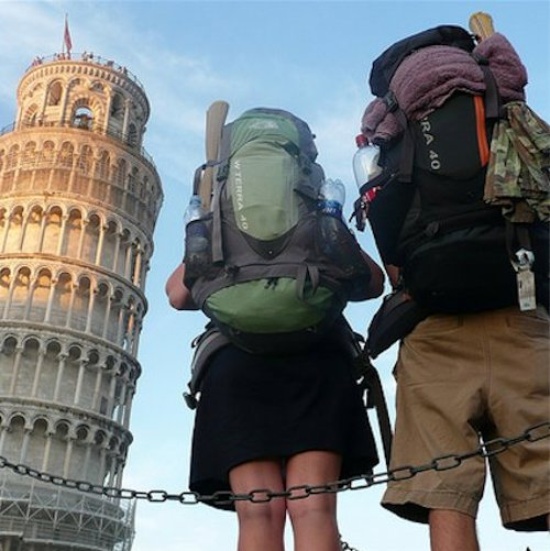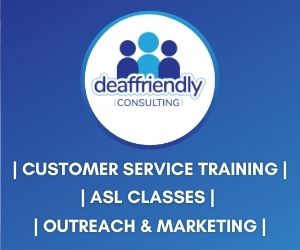The Wander-List: Why Deaf People Love to Travel
Posted by: Staff Writer on March 18, 2013

Ask any Deaf person what they’re saving up for, and travel more often than not makes the top of their list. Hearing aids (never mind that one of these bad boys can be worth an entire 10-day Ireland getaway), car payments, and the mortgage may be essentials, but hitting the road - or friendly skies - for a trip is what makes for a life well-lived. It’s an unwritten rule that Deafies are hooked on travel – and it’s not simply because we get “pre-board” privileges at the airport! We love to stamp our passports and we cannot lie. Here are the top reasons why:
We are scattered across the globe.
Forget making awkward talk over the punch bowl at 10- (or 20-) year alumni reunions hosted in stuffy high school basketball gyms. Deafhood is about exploring our personal journey together, in as many corners of the world we can find, and as often as we can find the time (and cash). We met them at Gallaudet, RIT, or C-SUN and enjoyed four years of student-hood together. We don’t start tribes of our own once the spouse, kids, and dog enter the picture. The Deaf Community is a global tribe.
Deafhood: A global experience, not a national one.
Don’t quite know how to sign BSL (except a few letters here and there)? No matter – we’re wired to be visual communicators without geographic boundaries. According to activist, researcher, author, and international Deaf scholar Paddy Ladd, when Deaf folks meet internationally, they use their visual talents to communicate. Whether you’ve traveled to a Deaflympics event in Taipei, Melbourne, or Bucharest, there’s no greater thrill than discovering that you can, indeed, combine Charades with mutual eagerness to teach and learn.
We’re political creatures.
Though Deafies are spread all over the ideology map, a fair amount of us tend to vote liberal (as was the case in the last election). But value systems can’t be fully formed until we’ve experienced life … here and elsewhere. “Everyone should travel before they vote,” declared European travel host Rick Steves. Travel doesn’t just broaden perspectives and fill our digital cameras’ memory cards; it drives the change-minded to correct the injustices they see. If you’re Deaf able to read this article, consider yourself rare (and lucky) in the global scheme of things: A 2009 report by the World Deaf Federation revealed that at least 90% of Deaf people in developing countries receive no formal education. Of those, only 1 to 2% get that education in sign language. That’s why the non-profit Discovering Deaf Worlds (DDW) is setting up capacity-building projects in developing countries. Aiming to increase accessible educational opportunities from 10 to 15%, the DDW network consists of 250 Deaf schools and organizations from 50 countries. But it’s not just about learning from the countries that are behind compared to us: It’s about examining the countries that are winning the deaf civil rights and education race. While Deaf illiteracy runs rampant elsewhere, Sweden (and certain places in Europe) is comparatively a Deaf Utopia. These are just a few of the many political lessons we learn each time we stamp our passport.
Less than 6 degrees of separation: What comes around, goes around.
Due to the Deaf Community’s tight-knit nature, most of us become networking pros within it. We’re used to loneliness in a hearing society, and determined not to let our comrades feel the same while away from home. Mention that you’re flying to Washington D.C. for a work-related conference, and you’ll instantly be referred to your buddy Steve’s buddy Jim. Or his other Gally buddy Joseph, who just moved to the city post-graduation. Next thing you know, you’re doing happy hour on H Street, chatting until dawn (see our “Long Deaf Goodbye” article), and brunching w/ the Chicago deaf posse who is in town. Lo and behold, you just might run into Jim again at the Deaflympics a few years later. Rinse, wash, and repeat.
We’re used to feeling like foreigners in our own country.
Sure, maybe we’ve got a naturalized U.S. citizenship and come from families who are all about apple pie, baseball, and Sinatra. But that doesn’t change a deeper cultural identity nested within: The deaf/hh community remains but a small fraction of the population. Experiencing more isolation and communication barriers than our fellow Americans adds up to one of two things: Feeling like a foreigner (negative), and feeling like a free agent no matter which part of the planet you end up in (positive). After a lifetime of dealing with fellow countrymen (or women) who just don’t get Deaf Culture, dealing with a psychotic taxi driver in Burma or haggling with a slipper vendor in Beijing is a comparative piece of cake.
We’re other-sense learners.
Having "lost" one sense, we've gained so many others. As multi-sensory animals, we must be fed by a thousand journeys into the unknown. Sure, you can learn about the Roman Empire by flipping through a few hundred pages. You could tune into captioned episodes of “Rick Steves’ Europe” on public television. Better yet, you could live vicariously through THE penultimate Deaf traveler, by checking out DeafNation’s “No Barriers with Joel Barrish”. But “show, don’t tell” is a powerful part of the Deaf Experience. It means tasting the curries of Morocco, feeling the thump-thump of bulls pounding the streets of Pamplona. Then, your senses sated by travel, you fly home with images both beautiful and haunting embedded into your mind. With any luck, we translate our travels to our creatively-driven careers as graphic designers, actors, artists, film directors, sign language teachers, entrepreneurs, and more.
We treasure social connections so deeply we splurge on plane tickets.
For a hearing person, other people are more than a dime a dozen. They’re like oxygen - omnipresent in our backyard, in other cities, in the grocery store, at the park, at work, at the gym. But for a deaf person, other deaf persons are less than a penny a dozen (statistically, that’s about 10 percent of us nationally). So we nurture our local and non-local connections. It’s a tribe, one that’s not defined by longitude, latitude, or even language. That’s something you’ll discover if you suddenly find yourself hosting a deaf couch surfer whose BSL finger spelling alphabet doesn’t look remotely like the one you use.
And....
Last but not least, the days of deaf-challenged travel are now getting better. TSA agents, hotel front desk clerks, and travel guides are getting more training about how to communicate with deaf and hard of hearing travelers. Some museums are beginning to offer sign language interpreters – and not merely “audio assistance systems” - for their guided tours. The days of enduring +5 hour trans-national flights without captioned movies are becoming less and less thanks to deaf-friendly airlines like United Airlines partnering with DirecTV to provide fully-captioned in-flight entertainment.
Got an itch to do some more travelling? Stay tuned for our next featured article about deaf-friendly airlines … who are evolving to feed the wanderlust in you!
Tags
- deaf
- hard of hearing
- deaf culture
- sign language
- travel
- rit
- ntid
- csun
- gallaudet
- hearing aids
- deaf blind
- deaf friendly
- deafhood
- deaf community
- bsl
- paddy ladd
- deaflympics
- taipei
- melbourne
- bucharest
- rick steves
- world deaf federation
- discovering deaf worlds
- ddw
- sweden
- europe
- deaf utopia
- washington dc
- deafnation
- no barriers
- joel barrish
- morocco
- pamplona
- tsa
- united airlines




Comments